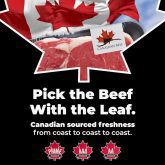hina. Just the name creates a buzz. Especially now that it is opening up once again to Canadian beef. Congratulations are due to all involved in pulling off this major coup.
The ripples created when beef was included in a co-operative agreement signed by President Hu Jintao during his visit to Canada for the G20 meetings were still running through the industry last month.
With Prime Minister Stephen Harper attending as well as Agriculture Minister Gerry Ritz and International Trade Minister Peter Van Loan it’s hard to imagine a higher-profile occasion for the beef industry.
Read Also

A strategic approach to risk on the ranch
Given the increase in the value of livestock and the market volatility, we need to cover our risks. First,…
Could this be the breakthrough that brings South Korea and the remaining holdouts to the table? We can hope.
Just a week after the signing Chinese officials approved the import of a special shipment so Governor General Michalle Jean, Gerry Ritz, Canadian Cattlemen’s Association (CCA) president Travis Toews and chairman of the Canada Beef Export Federation (CBEF) Gib Drury could serve up samples of Canadian beef to Chinese consumers during Canada Day at the World Expo in Shanghai.
A couple of days later Ritz met with officials in China who took the necessary regulatory steps to formally set aside the import ban on Canadian boneless beef under 30 months of age and tallow for industrial uses, effective July 3. Almost immediately Chinese officials were making arrangements to inspect Canadian beef plants.
This is just the first step in regaining full access for Canadian beef to Mainland China, similar to the process followed in the Hong Kong agreement. Apparently, China was ready to remove the ban on these products much earlier but without a commitment to move to full access. Canadian negotiators wisely held out for the full package.
Obviously, this is a crowning affirmation of Ottawa’s decision — at the urging of Canadian cattlemen — to abandon the U. S. all-or-nothing negotiating stance to regain market access for beef. As the U. S. Meat Export Federation noted in its press release recognizing the new agreement, “This deal with China is the latest and most commercially significant breakthrough by the Canadian government on behalf of its beef industry, and appears to be a solution fashioned in recognition of the needs and expectations of China.”
This nearly completes the Chinese triple crown for Canadian negotiators. First, Macau, then Hong Kong and now Mainland China. Aside from everything else this gives Canadian processors the lead over U. S. merchants in this growing market. Among U. S. processors Cargill, of course, gains a quick jump over its other U. S. competitors at least in so far as the production from its two Canadian plants. The company already maintains a trade office in Shanghai.
With this staged agreement we should see a gradual increase in sales values as more and more products are approved for import to the mainland. In 2002 Canadian plants sold $35 million worth of tallow alone to the mainland. In today’s dollars that same volume would generate $45 million. It should go higher given the growth in the Chinese economy since 2002.
The same is true for beef sales. In 2002 China was a relatively tiny market, about $3.5 million. But CBEF’s principal clients in Macau and Hong Kong estimate the current annual sales of $65 million will double once the mainland opens to all Canadian products.
Overall, CBEF is predicting sales of beef products to Macau, Hong Kong and China will grow by $110 million to $175 million when trade is fully normalized.
There is no set deadline for this march to full access.
Canada is the first country touched by BSE to regain access to China. Why they chose Canada isn’t as important as the fact that they did. Still, one can’t help but be curious.
Perhaps, Chinese officials simply calculated that they needed to secure new sources of protein for their 1.3 billion citizens, and we just happened to be first on the list. China also recently signed a bilateral trade deal with New Zealand that includes beef exports.
Why they have not yet turned to their largest trading partner, the U. S., is something American cattlemen are demanding of their government. Perhaps U. S. access is tied up with other trade negotiations going on between the two.
I prefer to think that team Canada earned this agreement. That includes everyone from the prime minister to the ministers of agriculture and trade, the new market access secretariat, CBEF, CCA and Canadian Meat Council who put beef on the front burner, resulting in a historic agreement that just may be key to moving us past BSE for good.
Now they can turn their attention to South Korea and Europe.
———
Coulditbe theonethat allowsus toputBSE behindus?
















